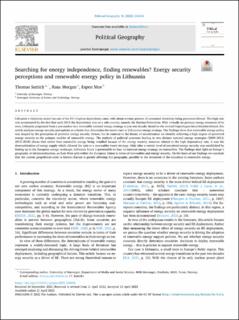| dc.contributor.author | Sattich, Thomas Michael | |
| dc.contributor.author | Morgan, Rasa | |
| dc.contributor.author | Moe, Espen | |
| dc.date.accessioned | 2022-12-16T08:30:22Z | |
| dc.date.available | 2022-12-16T08:30:22Z | |
| dc.date.created | 2022-04-24T17:00:36Z | |
| dc.date.issued | 2022 | |
| dc.identifier.citation | Political Geography. 2022, 96 . | en_US |
| dc.identifier.issn | 0962-6298 | |
| dc.identifier.uri | https://hdl.handle.net/11250/3038159 | |
| dc.description.abstract | Lithuania's electricity sector has one of the EU's highest dependency rates, with about seventy percent of consumed electricity being generated abroad. This high rate was accentuated by the fact that until 2015 the dependency was on a sole country, namely the Russian Federation. With virtually no primary energy resources of its own, Lithuania progressed from a pro-nuclear to a renewable national energy strategy in just one decade. Based on the revised Copenhagen Securitization School, this article analyses energy security perceptions as a factor that determines the recent turn in Lithuanian energy strategy. Our findings show that renewable energy policy was shaped by the perception of potential energy security threats, but in contrast to the theory of securitization we identify achieving a high degree of perceived energy security as the primary enabler of renewable energy. The analysis of political processes leading to two distinct national energy strategies (2009–2012; 2013–2018) shows that rather than renewable energy being installed because of the energy security concerns related to the high dependency rate, it was the desecuritization of energy supply which allowed the turn to a renewables-based strategy. Only after a certain level of perceived energy security was established by linking up to the European energy landscape, Lithuania found it permissible to base its national energy strategy on renewables. The findings shed light on Europe's geography of (de)securitization, an East-West split within the European Union in terms of renewables and energy security. On the basis of our findings we conclude that the current geopolitical crisis in Eastern Europe is greatly affecting this geography, possibly to the detriment of the transition to renewable energy. | en_US |
| dc.description.abstract | Searching for energy independence, finding renewables? Energy security perceptions and renewable energy policy in Lithuania | en_US |
| dc.language.iso | eng | en_US |
| dc.publisher | Elsevier | en_US |
| dc.rights | Navngivelse 4.0 Internasjonal | * |
| dc.rights.uri | http://creativecommons.org/licenses/by/4.0/deed.no | * |
| dc.title | Searching for energy independence, finding renewables? Energy security perceptions and renewable energy policy in Lithuania | en_US |
| dc.title.alternative | Searching for energy independence, finding renewables? Energy security perceptions and renewable energy policy in Lithuania | en_US |
| dc.type | Peer reviewed | en_US |
| dc.type | Journal article | en_US |
| dc.description.version | publishedVersion | en_US |
| dc.source.pagenumber | 12 | en_US |
| dc.source.volume | 96 | en_US |
| dc.source.journal | Political Geography | en_US |
| dc.identifier.doi | 10.1016/j.polgeo.2022.102656 | |
| dc.identifier.cristin | 2018718 | |
| cristin.ispublished | true | |
| cristin.fulltext | original | |
| cristin.qualitycode | 2 | |

